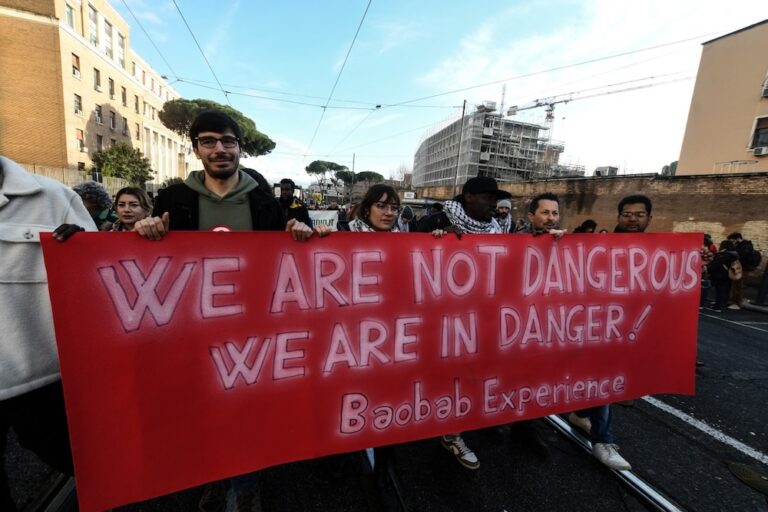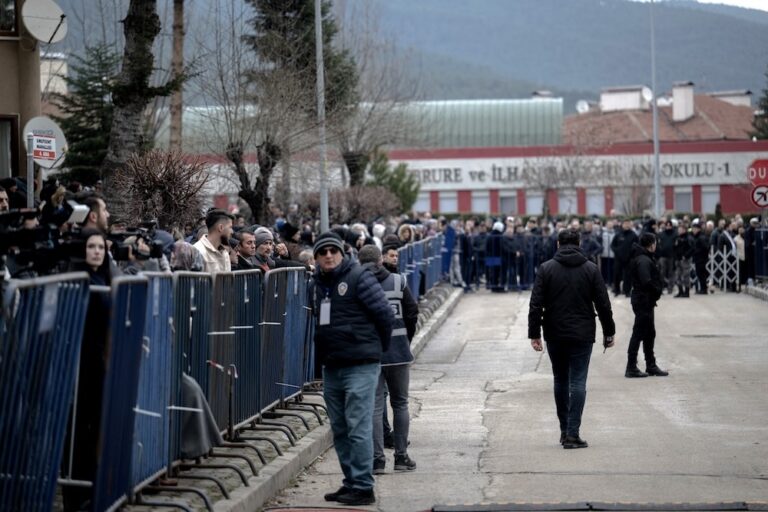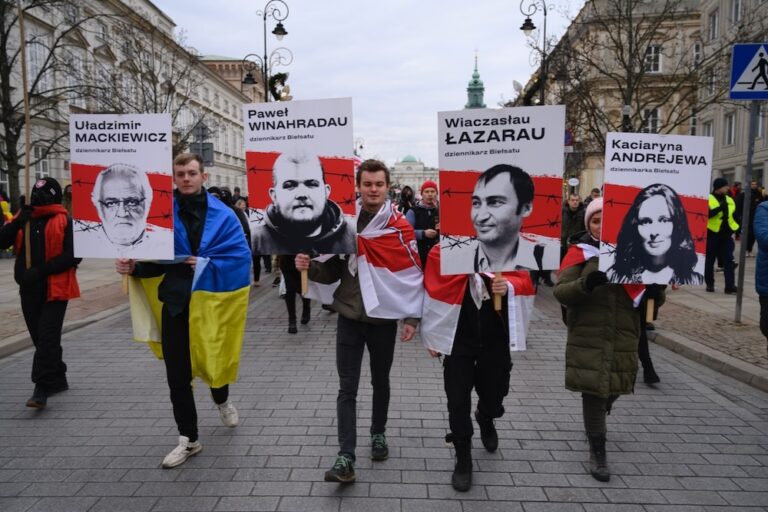January 2023 in Europe and Central Asia: A free expression round up produced by IFEX's Regional Editor Cathal Sheerin, based on IFEX member reports and news from the region.
January saw high profile, politically-motivated trials launched in Belarus and more civil society groups targeted in Russia. It also saw fears for free expression in Turkey ahead of elections in May, and a looming court battle between the UK and Scottish governments over gender self-ID legislation.
Anti-war activism and couples behind bars
President Lukashenka’s relentless “purge” of civil society in Belarus continues; January saw the launch of several high-profile, politically-motivated trials.
The long-awaited trial of Nobel Prize winner Ales Bialiatski and his Viasna colleagues Valiantsin Stefanovic and Uladzimir Labkovich began on 5 January. The defendants, who have been kept in a cage during the court hearings, are charged with “smuggling by an organised group” and “financing group actions that grossly violate public order”. They face between seven and 12 years in prison if convicted, and have already spent 18 months in pre-trial detention. Viasna is providing updates on their trial via Twitter and has invited the public to send messages of solidarity to the three men.
The trial in absentia of exiled opposition leader Sviatlana Tsikhanouskaya began on 17 January. She is accused of treason and faces up to 15 years in prison if convicted. Her husband, Syarhei Tsikhanouski, is currently serving an 18-year prison sentence in Belarus for attempting to run against Lukashenka in the 2020 presidential elections; he now faces a further two years in prison if convicted on recently-brought charges of “violating prison rules”.
Several journalists also went on trial in January: Andrzej Poczobut faces 12 years in prison if convicted on charges of “calling for actions aimed at harming national security” and “inciting hatred”; Tut.by’s executive director Lyudmila Chekina and editor-in-chief Maryna Zolatava also face 12 years in prison if convicted on charges of tax evasion, “inciting social enmity”, and “calling for actions aimed at harming national security”.
In early January, Lukashenka signed a new law that allows the state to strip Belarusians in exile of their Belarusian citizenship if they are convicted of “extremist activities” or “causing grievous harm” to Belarus’s interests. As an article by Human Rights Watch explains, the state has been able to do this to naturalised Belarusian citizens since 2021; the new law extends these legal provisions to natural-born citizens. Journalists and activists convicted in absentia (as at least five were in January) could potentially be made stateless.
The Belarusian Association of Journalists (BAJ) published two reports this month that offer insights – from two different perspectives – into the brutal effects of Lukashenka’s crackdown on opposition voices and civil society. Their review of 2022 presents all the grim statistics of a year that saw 33 journalists behind bars, nine media outlets and 100 online sources declared “extremist organisations”, and 17 heavy prison sentences handed to media workers. The targeting of families is the focus of BAJ’s report entitled ‘Love behind bars’, which looks at couples (journalists and their partners) who have been arrested and/or imprisoned on spurious charges. Among these couples are former Index on Censorship and ARTICLE 19 employee Andrei Aliaksandrau, and his wife, Irina Zlobina: 12 January marked their second year behind bars.
Viasna’s new report about the crackdown on anti-war activists in Belarus is essential reading. In the first 50 days of Russia’s war on Ukraine (launched in February 2022), at least 1,500 people were detained for protesting both Russian aggression and the Lukashenka regime for helping to facilitate it.
This anti-war activism takes many forms. According to Viasna, 2022 saw 30 people convicted for taking photographs of Russian military equipment and passing these images to independent media; it also saw seven so-called ‘rail guerrillas’ handed extremely heavy sentences (over 20 years in prison in some cases) for disabling railway equipment in order to disrupt Russian military transportation. Viasna’s report looks at a selection of representative cases, including those where activists were arrested and/or beaten for wearing anti-war t-shirts, flying the Ukrainian flag, laying flowers outside the Ukrainian embassy, or shouting “Putin is a dickhead”.
Anxiety ahead of elections
Turkey began the new year as it ended the old one: with prison sentences for freely expressed opinion, and concerns about a free speech crackdown ahead of presidential and parliamentary elections in May.
On 11 January, human rights defender Şebnem Korur Fincancı was convicted of “terrorist propaganda” for calling for an investigation into allegations that the army used chemical weapons against Kurdish separatists in northern Iraq. She was sentenced to 2 years 8 months and 15 days in prison, but was released pending appeal. Fincancı had been in pre-trial detention since 27 October 2022.
Fincancı will be on trial again on 1 February, alongside Reporters Without Borders’s Turkey Representative Erol Önderoğlu and journalist Ahmet Nesin, for their peaceful act of solidarity with the Kurdish opposition newspaper Özgür Gündem in 2016. Convicted of “terrorist propaganda” because of this action and later acquitted, the three are now being retried following the reversal of that acquittal in 2020. They have been in legal limbo for over three years due to several postponements of their retrial.
Another case of special interest to IFEX members is that of exiled journalist Can Dündar. At the end of 2022, he revealed that he was one of at least 15 Turkish journalists on the so-called “gray list” of alleged terrorists. This list is published by the Turkish Ministry of the Interior, which offers financial rewards for the capture of those listed (in Dündar’s case, the reward is approximately US$26,697). Dündar faces nearly 30 years in prison if forced to return to Turkey following his 2020 conviction on ridiculous charges of espionage and assisting supporters of the exiled religious leader Fethullah Gülen.
As several rights organisations have warned, the Turkish government has been increasing its censorship powers, its targeting of perceived critics, and its anti-LGBTQI+ rhetoric ahead of the elections in May. The impact of the new, so-called ‘disinformation law’ is yet to be fully felt, but it is feared that this legislation will be used to target opposition voices and restrict access to information as polling day approaches. According to Bianet’s review of the final three months of 2022, “Journalists and media outlets who want to exercise their right to investigation and criticism are preparing for elections in deep anxiety”. The same review provides shocking statistics for the last quarter of 2022, during which 171 journalists stood trial, 25 Kurdish media workers were arrested, 257 online news articles were censored, and eight journalists were physically attacked (on four occasions by the police).
However, January did offer some encouraging news in the battle against impunity: ten men were convicted for their involvement in the 2022 murder of journalist Güngör Arslan.
Gender self-ID
In the UK, the issue of gender identity hit the headlines this month when the UK government said it would veto the Gender Recognition Reform Bill (GRR) that was passed by the devolved parliament of Scotland in December.
The bill is intended to make it easier for trans people to legally change their gender by allowing them to self-certify (or ‘self-ID’), and by extending this new right to 16 to 18-year-olds. A medical diagnosis of gender dysphoria and a long waiting period will no longer be required.
Trans rights are a polarising issue in the UK, with mainstream newspapers running at least one anti-trans story every day throughout 2022. A 2021 study showed that 31% of the British public believed that trans rights should be expanded, while another 31% believed that trans rights had gone far enough already. Trans people are one of the UK’s most discriminated groups .
Several critics of Scotland’s GRR (including ministers in the UK government) have argued that there is a safety issue at stake, saying that the right to self-ID could be abused by predatory individuals who might then use it to gain access to women-only spaces. This is a key concern raised by Reem Alsalem, UN Special Rapporteur on violence against women and girls, in her criticisms of the bill.
However, Victor Madrigal-Borloz, the UN Independent Expert on sexual orientation and gender identity, points to a lack of evidence supporting those fears. Writing in The Scotsman in support of the GRR, Madrigal-Borloz says: “In the 13 countries and dozens of regions that already have self-identification – whose populations together add up to some 350 million people – there are no administrative or judicial findings that validate the idea that the risk of abuse is a material one”. He also urges states to address gender and sex-based violence using all preventative measures, but emphasises that “stopping trans women from the enjoyment of their human rights is not one of them”.
Gender self-ID is also supported by the Council of Europe Commissioner for Human Rights, Dunja Mijatović. In her report based on a visit to the UK in 2022 she states that, “lowering barriers to legal gender recognition is key to the full realisation of trans people’s rights” and that “from a human rights perspective, self-determination models for legal gender recognition represent a best practice”. The Commissioner warns against treating “the protection of the rights of trans people and those of women as a zero-sum game”, and expresses her concern about the “deliberate attempts by some politicians to turn the situation of trans people into ‘culture wars’ or a ‘wedge’ issue for electoral purposes”.
The Scottish government has said it will challenge the UK government’s veto in court.
The Scottish government has also said it will review the management of trans prisoners to ensure that transwomen with a history of violence against women will not be held in women’s prisons. This follows days of disturbing headlines about a transwoman who was convicted of raping two women while a man, and who, after starting the gender-reassignment process, was initially remanded in a women’s prison. Although several commentators and newspapers have conflated this story with the GRR (which is not in force), they are two separate issues.
Gender self-ID laws are advancing in Europe: Germany, Finland, and the Netherlands are debating them; in Spain, La ley LGTBI y trans (‘the LGTBI and trans law’), which includes gender self-ID, was passed by the congress in December and is now being considered by the senate. Ireland, Malta, Belgium, Portugal, Denmark, Iceland and Norway already have gender self-ID legislation.
For an insight into what gender self-ID laws mean to trans people’s life experiences in Europe, check out Enrique Anarte’s article for the LGBTQI+ platform Openly.
In brief
In Russia, the Putin government’s crackdown on civic space continues unabated. Late January saw a Moscow court order the Moscow Helsinki Group, Russia’s oldest independent human rights organisation, to be shut down; it also saw independent media outlet Meduza declared an “undesirable” organisation, effectively banning it from operating in the country; the Andrei Sakharov Foundation, a human rights group, received the same designation.
In Kyrgyzstan, the Ministry of Culture is seeking the closure of news outlet Radio Azattyk because of a 2022 video report about clashes on the Kyrgyz/Tajik border. The outlet’s websites have been blocked since October 2022.



